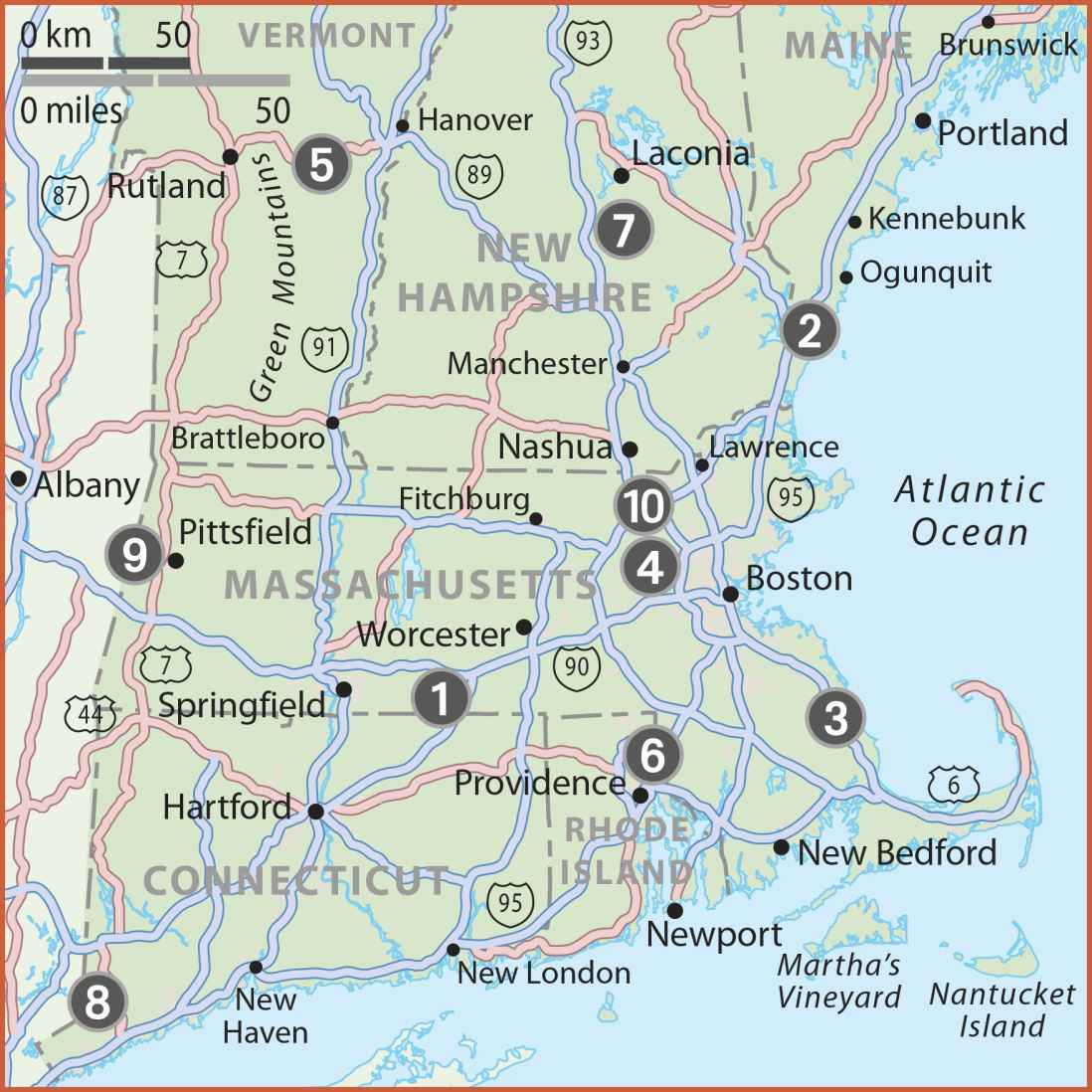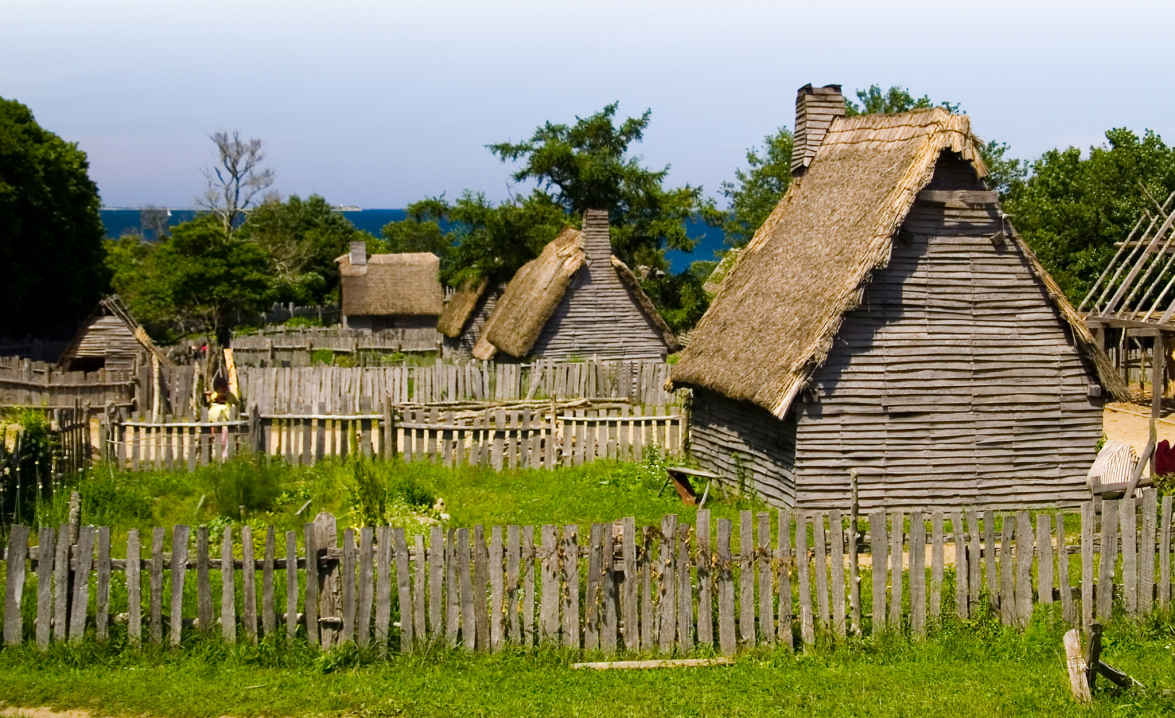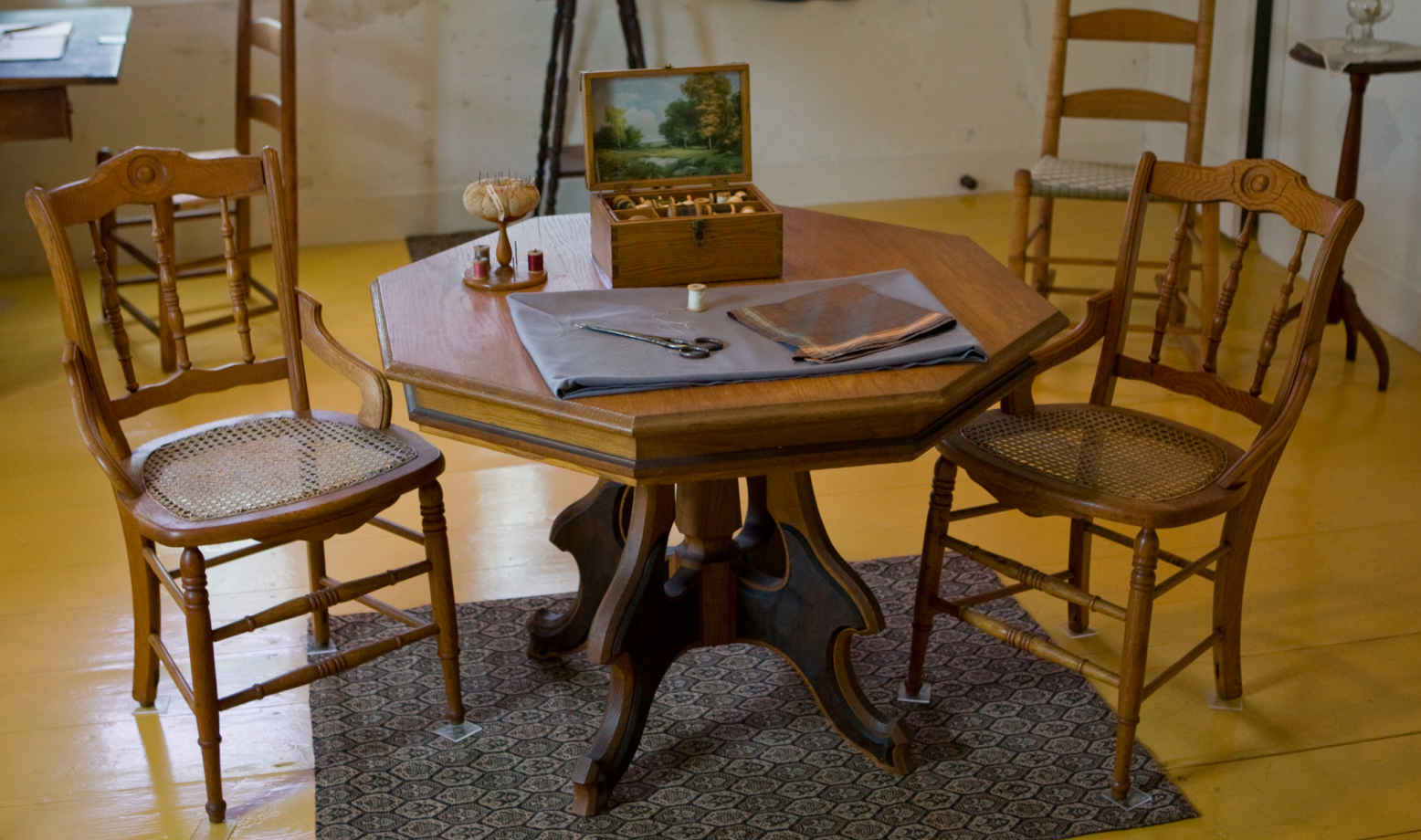COLONIAL AND HISTORIC SITES

1. Old Sturbridge Village, MA
 Rte 20, Sturbridge • 508 347 3362
• Open mid-May–Oct: 9:30am–5pm daily; call for winter hours • Adm •
www.osv.org
Rte 20, Sturbridge • 508 347 3362
• Open mid-May–Oct: 9:30am–5pm daily; call for winter hours • Adm •
www.osv.org
Heritage livestock breeds and costumed guides create a vivid sense of New England rural life in the early 19th century at this living history museum. The village features more than 40 historic buildings moved from across the region.
2. Strawbery Banke, NH
 14 Hancock St, Portsmouth • 603 433 1100
• Open May–Oct: 10am–5pm daily; Nov–Dec: call for tour hours • Adm •
www.strawberybanke.org
14 Hancock St, Portsmouth • 603 433 1100
• Open May–Oct: 10am–5pm daily; Nov–Dec: call for tour hours • Adm •
www.strawberybanke.org
Follow the development and growth of Portsmouth, NH, in this complex of historic dwellings assembled at Strawbery Banke, the city’s original settlement. Period furnishings and historical gardens help to chronicle the daily life of the seaside city from the 17th to the 20th century.
3. Plimoth Plantation, MA
 137 Warren Ave, Plymouth • 508 746 1622
• Open late Mar–Nov: 9am– 5pm daily • Adm •
www.plimoth.org
137 Warren Ave, Plymouth • 508 746 1622
• Open late Mar–Nov: 9am– 5pm daily • Adm •
www.plimoth.org
Step back in time to 1627 at Plimoth Plantation, where costumed interpreters speaking 17th-century English portray original settlers inside the stockaded village so studiously that references to modern life are met with quizzical looks. There are Native American interpreters on hand at the re-created Wampanoag encampment.

Plimoth Plantation
4. Minute Man National Historical Park, MA
 North Bridge Visitor Center:
174 Liberty St, Concord • 978 369 6993
• Open daily (visitor center open Apr–Oct: 9:30am–5:30pm daily; call for winter hours) •
www.nps.gov/mima
North Bridge Visitor Center:
174 Liberty St, Concord • 978 369 6993
• Open daily (visitor center open Apr–Oct: 9:30am–5:30pm daily; call for winter hours) •
www.nps.gov/mima
On April 19, 1775, British troops engaged Colonial rebels in Lexington and Concord. This opening salvo of the American Revolution sent the British into retreat and galvanized other colonies to take up arms. Exhibits and annual reenactments depict a stirring historical moment.

Minute Man statue
5. Billings Farm & Museum, VT
 5302 River Rd, Woodstock • 802 457 2355
• Open May–Oct: 10am–5pm daily; Nov–Feb: 10am–4pm Sat–Sun • Adm •
www.billingsfarm.org
5302 River Rd, Woodstock • 802 457 2355
• Open May–Oct: 10am–5pm daily; Nov–Feb: 10am–4pm Sat–Sun • Adm •
www.billingsfarm.org
Set up in 1871, Billings Farm was turned into a museum of rural life in 1982. Its rolling green pastures and fine farm buildings represent the ideal of Vermont dairy farming. Interact with sheep, horses, and chickens, and watch the herd of Jersey cows being milked.
6. Slater Mill, RI
 67 Roosevelt Ave, Pawtucket • 401 725 8638
• Open Mar–Apr & Nov: 11am–3pm Sat–Sun; May–Jun & Sep–Oct: 10am–4pm Tue–Sun; Jul–Aug: 10am–4pm daily • Adm •
www.slatermill.org
67 Roosevelt Ave, Pawtucket • 401 725 8638
• Open Mar–Apr & Nov: 11am–3pm Sat–Sun; May–Jun & Sep–Oct: 10am–4pm Tue–Sun; Jul–Aug: 10am–4pm daily • Adm •
www.slatermill.org
Dating from 1793, Slater Mill was the first successful cotton-spinning mill in the United States. The ingenuity of the early machinery, which was driven by water power transmitted through giant flapping leather belts, will fascinate engineering buffs.
7. Canterbury Shaker Village, NH
 288 Shaker Rd, Canterbury • 603 783 9511
• Open mid-May–Oct: 10am–5pm daily; call for winter tour hours • Adm •
www.shakers.org
288 Shaker Rd, Canterbury • 603 783 9511
• Open mid-May–Oct: 10am–5pm daily; call for winter tour hours • Adm •
www.shakers.org
Founded in 1792, Canterbury was a working Shaker village into the 1960s. Demonstrations and workshops teach you about Shaker skills and ideals, while informative daily tours of original Shaker buildings include fond anecdotes of the sect’s final generation.
8. Weir Farm National Historic Site, CT
 735 Nod Hill Rd, Wilton • 203 834 1896
• Open May–Oct: 10am– 4pm; grounds open dawn–dusk year-round •
www.nps.gov/wefa
735 Nod Hill Rd, Wilton • 203 834 1896
• Open May–Oct: 10am– 4pm; grounds open dawn–dusk year-round •
www.nps.gov/wefa
The painter J. Alden Weir (1852–1919) made this rustic farm into a retreat for himself and his friends at the end of the 19th century. Two more generations of artists worked here before the property passed into the care of the National Park Service.
9. Hancock Shaker Village, MA
 1843 W. Housatonic St, Rte 20, Pittsfield • 413 443 0188
• Open mid-Apr–late Jun: 10am–4pm daily; late Jun–Oct: 10am–5pm daily • Adm •
www.hancockshakervillage.org
1843 W. Housatonic St, Rte 20, Pittsfield • 413 443 0188
• Open mid-Apr–late Jun: 10am–4pm daily; late Jun–Oct: 10am–5pm daily • Adm •
www.hancockshakervillage.org
Learn about the artful skills of the Shakers at this settlement founded in 1790. The iconic 1826 Round Stone Barn perfectly encapsulates their ability for making things both functional and beautiful.

Canterbury Shaker Village
10. Lowell National Historical Park, MA
 Visitor Center:
246 Market St, Lowell • 978 970 5000
• Open mid-Mar–Nov: 9am–5pm daily; call for winter and tour hours • Adm •
www.nps.gov/lowe
Visitor Center:
246 Market St, Lowell • 978 970 5000
• Open mid-Mar–Nov: 9am–5pm daily; call for winter and tour hours • Adm •
www.nps.gov/lowe
Lowell launched the Industrial Revolution in the United States, and this urban park preserves the city’s network of canals and many of its 19th-century textile mills. The racket of the mighty water-powered looms operating in the 1864 Boott Cotton Mill gives a real sense of what it was like to work here.


